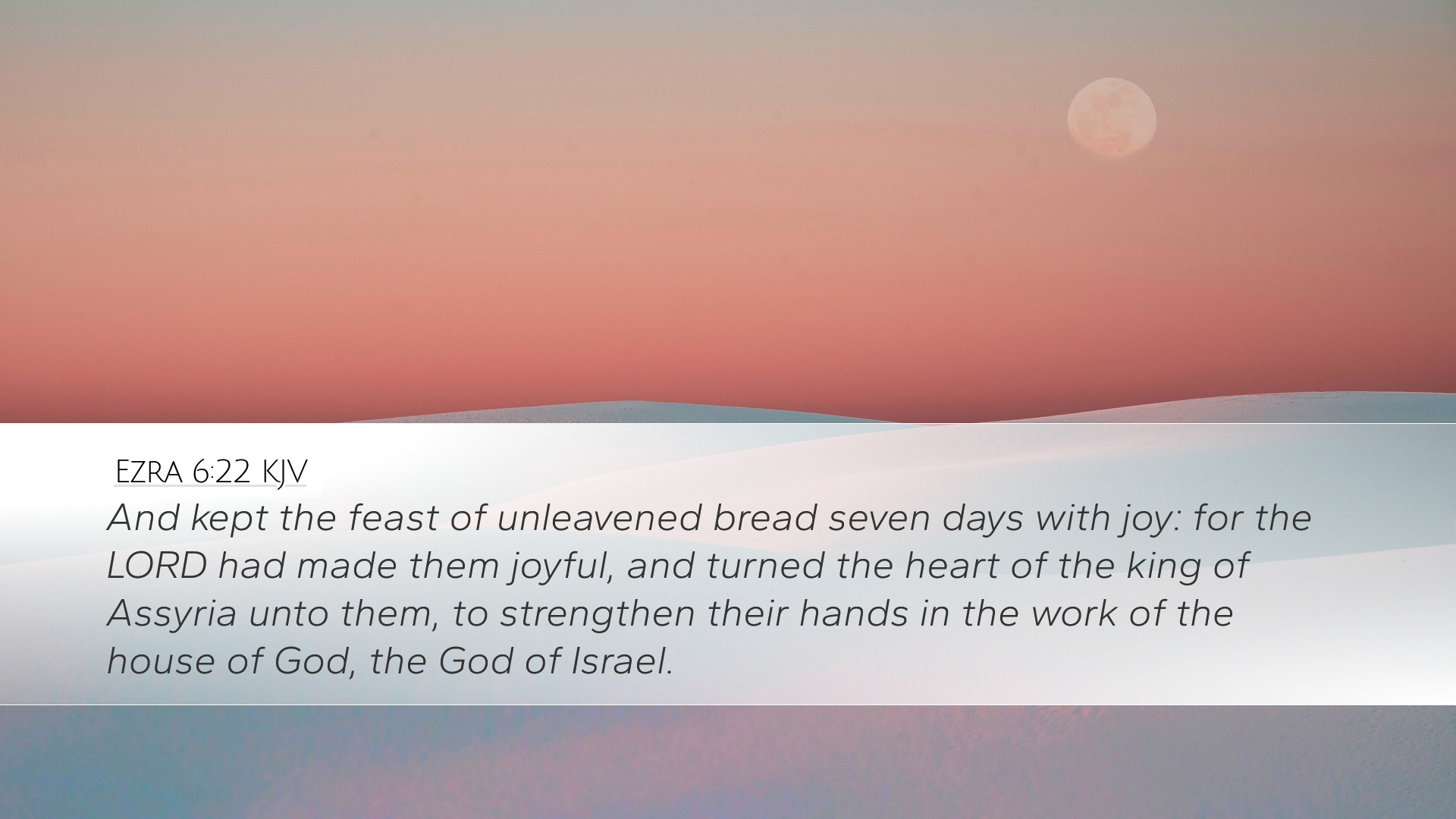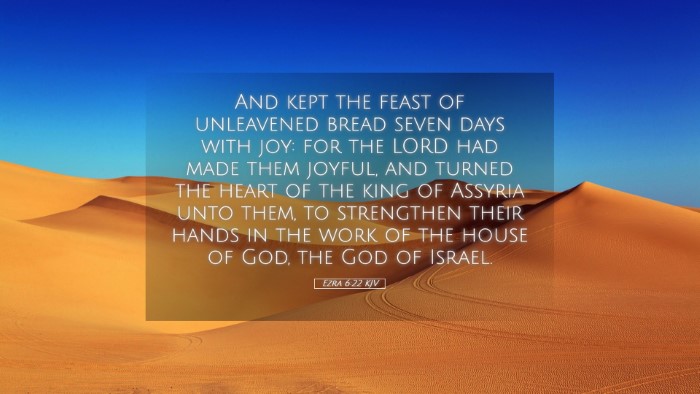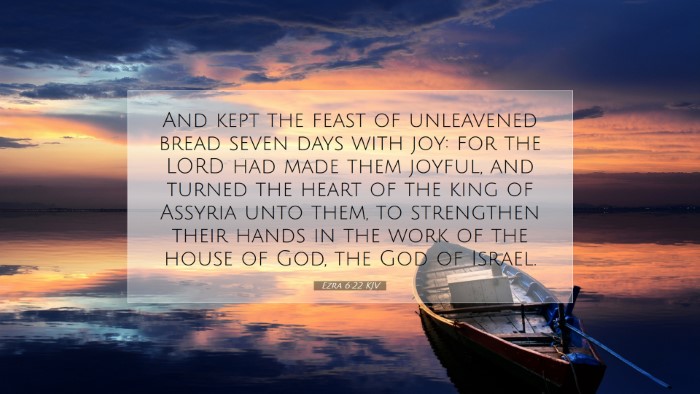Old Testament
Genesis Exodus Leviticus Numbers Deuteronomy Joshua Judges Ruth 1 Samuel 2 Samuel 1 Kings 2 Kings 1 Chronicles 2 Chronicles Ezra Nehemiah Esther Job Psalms Proverbs Ecclesiastes Song of Solomon Isaiah Jeremiah Lamentations Ezekiel Daniel Hosea Joel Amos Obadiah Jonah Micah Nahum Habakkuk Zephaniah Haggai Zechariah MalachiEzra 6:22
Ezra 6:22 KJV
And kept the feast of unleavened bread seven days with joy: for the LORD had made them joyful, and turned the heart of the king of Assyria unto them, to strengthen their hands in the work of the house of God, the God of Israel.
Ezra 6:22 Bible Commentary
Commentary on Ezra 6:22
Ezra 6:22 states:
"And kept the feast of unleavened bread seven days with joy: for the Lord had made them joyful, and turned the heart of the king of Assyria unto them, to strengthen their hands in the work of the house of God, the God of Israel."
Introduction
This verse captures a significant moment in the history of the exiled Israelites as they return to their homeland to rebuild the temple in Jerusalem. The emphasis on joy, divine favor, and communal celebration provides rich ground for theological reflection and application. Scholars, pastors, and students can derive important lessons from this pivotal moment in the post-exilic community.
Thematic Overview
- The Significance of the Feast of Unleavened Bread
- The Role of Joy in Worship
- The Influence of Authority on God’s People
- Divine Intervention in Human Affairs
The Significance of the Feast of Unleavened Bread
The Feast of Unleavened Bread is intricately linked to the Passover, commemorating the Israelites' exodus from Egypt. According to Matthew Henry, this feast symbolizes purification and the removal of sin, which is fitting as the returned exiles sought to restore their covenant relationship with God. The observance of this feast indicates their commitment to uphold the ordinances of their faith.
Albert Barnes notes that the seven-day celebration reflects a totality of spiritual renewal. The act of keeping this feast serves as a powerful reminder of God’s redemptive power and the importance of maintaining holiness among God’s people, especially in the context of worship and communal identity.
The Role of Joy in Worship
Joy is a central theme in this scripture. The phrase "with joy" signifies the exuberance of the people as they engage in worship. According to Adam Clarke, the joy stems not only from their successful return and restoration but also as an intrinsic response to God’s faithfulness. This joy is depicted as a divine gift, highlighting that true joy in worship should be a byproduct of a deep relationship with God.
As Matthew Henry points out, joy in worship is essential; it uplifts the community and attracts others to the faith. The communal nature of their celebration underscores that worship is not an isolated experience but one that strengthens the bonds of community centered around the awe of God's grace.
The Influence of Authority on God’s People
The role of King Darius in allowing the Jews to rebuild the temple showcases the impact of secular authorities on the work of God’s people. Albert Barnes reflects on the idea that God can sway the hearts of kings and rulers according to His purpose. The "heart of the king of Assyria" turning toward the Jewish people illustrates God’s sovereignty over earthly power and the means through which He fulfills His promises to His people.
This aspect is especially relevant for contemporary readers as it raises the question of how Christians might engage with political authorities. Their focus should be on trusting in God’s ability to influence leaders to create an environment where worship and ministry can flourish.
Divine Intervention in Human Affairs
This verse culminates in the profound realization of divine intervention. The phrase "for the Lord had made them joyful" points to God's active role in the restoration of His people. Adam Clarke elaborates that God not only instills joy but also empowers the community to rebuild. The acknowledgment of God's sovereignty gives believers confidence that He is involved in the details of their lives and communities.
In light of this, pastors and theologians are encouraged to articulate God's relentless grace and presence in contemporary life. The exiles' joy is a model for Christians today, urging them to recognize and celebrate God’s hand in their circumstances, no matter how challenging they may seem.
Conclusion
Ezra 6:22 serves as a theological and communal touchstone for understanding the nature of worship, joy, divine favor, and the relationship between God’s people and earthly authorities. Through the lens of public domain commentaries, we gain a more profound appreciation for the interplay of God’s faithfulness and human response. As pastors, students, theologians, and Bible scholars reflect on this verse, they find valuable truths that resonate through time, encouraging community connection, joy in worship, and trust in God's providential care.


